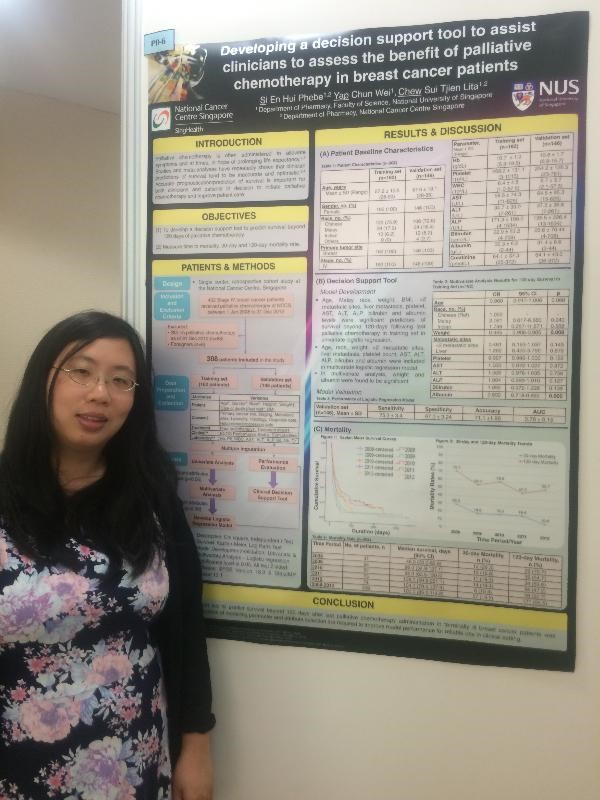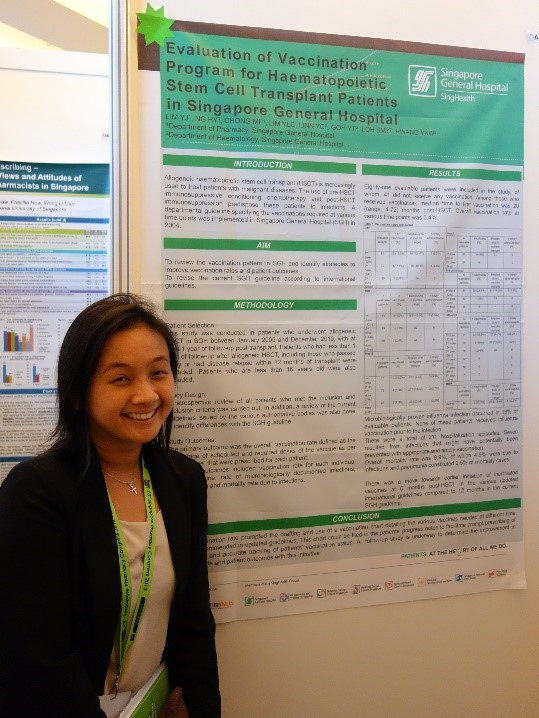Hear from our Pharmacy residents going PGY2 Oncology residency programme!
A Day in the Life of a PGY2 (Oncology) Resident
- How many years have you been practicing as an oncology pharmacist and what made you want to enroll into the PGY2 (Oncology) Programme?
Mui Fong: After my pre- registration training and one year as an inpatient pharmacist at SGH, I moved to the Haematology Pharmacy at SGH as I was drawn by the dynamic nature of Haem/Onc. It has been 7 years since. I enrolled into the PGY2 (Oncology) programme this year, to hone my skills and knowledge in this area, so as to provide holistic care at a more advanced level to my patients.
Phebe: Having been practicing as an oncology pharmacist since 2010 at the National Cancer Centre, where focus of care is mainly adult patients with solid tumors, I decided to pursue the PGY2 Oncology Programme as it provides valuable opportunity for exposure to other oncology pharmacy practice sites and patient populations not encountered in everyday practice such as pediatrics and hematology. This serves as impetus to challenge myself to step out of my comfort zone and to expand my horizons so that I will be able to provide more holistic and better patient care. It is also interesting to discover how practices vary even in tiny Singapore so that we can learn and adopt best practices from one other.
- Could you describe how a typical day would be like for a PGY2 Oncology Resident?
Mui Fong: On a typical day, I would join the ward team for rounds in the morning and follow up on the patients throughout the day as needed. On some days, I may be attached to the outpatient clinics or laboratories to view provision of care from different perspectives. Preceptors would meet up with residents regularly to discuss cases as well as have topic discussions or journal clubs. Participating in the education of junior pharmacists as well as other members of the healthcare team is also something I enjoy doing as part of my residency.
Phebe: There is no “typical” day as each rotation is unique and has its own schedule/activities. Each day/patient also brings their own surprises. Being a resident, there is a slight luxury of time and flexibility/fluidity to be able to arrange and participate in ad-hoc activities/projects when need/opportunity arise. For example, I managed to arrange to follow through patient seen during hospital outpatient clinic who was non-compliant to oral chemotherapy and pain medications with home visit, together with nurses, to provide medication reconciliation and counselling at his home. This truly embodies the spirit of bringing cancer care into the community and to our patients. Other “typical” activities include inpatient ward rounds, outpatient clinic attachments, patient counselling/follow up, medication reconciliation, answering drug information enquires, attending tutorial/teaching sessions, mini-projects, topic discussions, journal club presentations and case presentations/discussions with preceptors.
- What has been your most memorable experience to date during the residency programme and why?
Mui Fong: My palliative care rotation was truly one that was memorable for me. Beyond pain management, I learnt how to have difficult conversations with patients and their family, and how to support them through difficult times. These communication and soft skills I have picked up would go a long way in helping me develop stronger relationships with my patients.
Phebe: This may be recency bias, but the latest rotation to Department of Radiation Oncology (DRO) left a huge impression. Before residency, though being located in same building, the fingers on one hand was more than sufficient to count the times I have been there. It allowed me to witness patient care from different perspective and better understand a totally different, yet equally important aspect of cancer treatment and journey of our cancer patients. The radiotherapists were also very interested in chemotherapy and what we do upstairs at the Ambulatory Treatment Unit and I was honored to be able to share. Embracing the spirit cross-interdisciplinary learning greatly deepened my knowledge and understanding of role of our other allied health colleagues. Just as chemotherapy and radiotherapy are vastly different but are employed for the same purpose, I was greatly assured that though we hail from different departments, have different jobs positions and play different roles, ultimately, our goals are same - to journey with and provide best care for our patients.
- What are the challenges that you have faced during the residency and how did you overcome it/them?
Mui Fong: One of the greatest challenges during residency would be the prioritizing of tasks within the limitations of multiple deadlines. But well, you just get better at it over time!
Phebe: The tick-tock, tick-tock of the clock… 24 hours in a day is never enough! With the various competing interests for time, I have to constantly remind myself to focus on the essential. The residency has been a good exercise in getting me to learn to curb my own “OCD-ness” and not be too hung up on non-important or non-essential issues/aspects.
- What is your advice for fellow pharmacists who would like to pursue an oncology residency?
Mui Fong: Do what you enjoy and you will have the drive to keep going on. Go in with an open heart, and you'll be surprised what you'll get out of it!
Phebe: Just do it. A journey of a thousand miles begins with a single step. Embrace and grow with challenges as they come along for smooth seas do not make skillful sailors. Stay focused and persevere on! Also, it would also be very helpful to have a relevant research project topic in mind beforehand.
Phebe (left) and Mui Fong (right) with their posters




